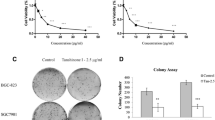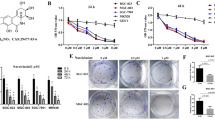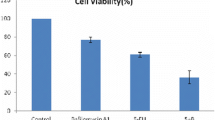Abstract
Toxicarioside N (Tox N), a natural product extract from Antiaris toxicaria, has been reported to induce apoptosis in human gastric cancer cells. However, the mechanism and actual role of autophagy in Tox N-induced apoptosis of human gastric cancer cells remains poorly understood. In the current study, we demonstrated that Tox N could induce autophagy by inhibiting the Akt/mTOR signaling pathway in SGC-7901 cells. Moreover, we found that the inhibition of autophagy by 3-methyladenine, an autophagy inhibitor, enhanced Tox N-induced apoptotic cell death. However, the stimulation of autophagy by rapamycin, an autophagy activator, remarkably suppressed Tox N-induced apoptosis, suggesting that autophagy plays a protective role in Tox N-induced apoptosis. Thus, the results from this study suggested that Tox N combination with an autophagy inhibitor might be a promising strategy to enhance the anticancer activity of Tox N for the treatment of human gastric cancer.





Similar content being viewed by others
References
Brothers KM, Kowalski RP, Tian S, Kinchington PR, Shanks RMQ (2018) Bacteria induce autophagy in a human ocular surface cell line. Exp Eye Res 168:12–18
Chang YT, Tseng HC, Huang CC, Chen YP, Chiang HC, Chou FP (2011) Relative down-regulation of apoptosis and autophagy genes in colorectal cancer. Eur J Clin Invest 41:84–92
Charalampakis N, Economopoulou P, Kotsantis I, Tolia M, Schizas D, Liakakos T, Elimova E, Ajani JA, Psyrri A (2018) Medical management of gastric cancer: a 2017 update. Cancer Med 7:123–133
Cho KH, Park JH, Kwon KB, Lee YR, So HS, Lee KK, Lee SY, Moon SR, Yang SH (2014) Autophagy induction by low-dose cisplatin: the role of p53 in autophagy. Oncol Rep 31:248–254
Cragg GM, Pezzuto JM (2016) Natural products as a vital source for the discovery of cancer chemotherapeutic and chemopreventive agents. Med Princ Pract. 2:41–59
Dou Q, Chen HN, Wang K, Yuan K, Lei Y, Li K, Lan J, Chen Y, Huang Z, Xie N, Zhang L, Xiang R, Nice EC, Wei Y, Huang C (2016) Ivermectin induces cytostatic autophagy by blocking the PAK1/Akt axis in breast cancer. Cancer Res 76:4457–4469
Foukakis T, Lundell L, Gubanski M, Lind PA (2007) Advances in the treatment of patients with gastric adenocarcinoma. Acta Oncol 46:277–285
Fulda S, Kögel D (2015) Cell death by autophagy: emerging molecular mechanisms and implications for cancer therapy. Oncogene 34:5105–5113
Huang FY, Mei WL, Li YN, Tan GH, Dai HF, Guo JL, Wang H, Huang YH, Zhao HG, Zhou SL, Lin YY (2012) Toxicarioside A inhibits tumor growth and angiogenesis: involvement of TGF-beta/endoglin signaling. PLoS ONE 7:e50351
Huang YH, Sun Y, Huang FY, Li YN, Wang CC, Mei WL, Dai HF, Tan GH, Huang C (2017) Toxicarioside O induces protective autophagy in a sirtuin-1-dependent manner in colorectal cancer cells. Oncotarget. 8:52783–52791
Lee HW, Jang KS, Choi HJ, Jo A, Cheong JH, Chun KH (2014) Celastrol inhibits gastric cancer growth by induction of apoptosis and autophagy. BMB Rep. 47:697–702
Levin-Salomon V, Bialik S, Kimchi A (2014) DAP-kinase and autophagy. Apoptosis 19:346–356
Li X, Xu HL, Liu YX, An N, Zhao S, Bao JK (2013) Autophagy modulation as a target for anticancer drug discovery. Acta Pharmacol Sin 34:612–624
Liu C, Liao JZ, Li PY (2017) Traditional Chinese herbal extracts inducing autophagy as a novel approach in therapy of nonalcoholic fatty liver disease. World J Gastroenterol 23:1964–1973
Newman RA, Yang P, Pawlus AD, Block KI (2008) Cardiac glycosides as novel cancer therapeutic agents. Mol Interv. 8:36–49
Prassas I, Diamandis EP (2008) Novel therapeutic applications of cardiac glycosides. Nat Rev Drug Discov. 7:926–935
Prassas I, Karagiannis GS, Batruch I, Dimitromanolakis A, Datti A, Diamandis EP (2011) Digitoxin-induced cytotoxicity in cancer cells is mediated through distinct kinase and interferon signaling networks. Mol Cancer Ther 10:2083–2093
Rubinsztein DC, Codogno P, Levine B (2012) Autophagy modulation as a potential therapeutic target for diverse diseases. Nat Rev Drug Discov. 11:709–730
Shi LS, Liao YR, Su MJ, Lee AS, Kuo PC, Damu AG, Kuo SC, Sun HD, Lee KH, Wu TS (2010) Cardiac glycosides from Antiaris toxicaria with potent cardiotonic activity. J Nat Prod 73:1214–1222
Singh SS, Vats S, Chia AY, Tan TZ, Deng S, Ong MS, Huang RY, Shen HM, Manjithaya R, Kumar AP (2018) Dual role of autophagy in hallmarks of cancer. Oncogene 37:1142–1158
Tanida I, Waguri S (2010) Measurement of autophagy in cells and tissues. Methods Mol Biol 648:193–214
Torre LA, Bray F, Siegel RL, Ferlay J, Lortet-Tieulen J, Jemal A (2015) Global cancer statistics, 2012. Cancer Epidemiol Biomark Prev 65:87–108
Van Cutsem E, Sagaert X, Topal B, Haustermans K, Prenen H (2016) Gastric cancer. Lancet 388:2654–2664
Vitale I, Manic G, Dandrea V, De Maria R (2015) Role of autophagy in the maintenance and function of cancer stem cells. Int J Dev Biol 59:95–108
Zhang Y, Zhou ZW, Jin H, Hu C, He ZX, Yu ZL, Ko KM, Yang T, Zhang X, Pan SY, Zhou SF (2015) Schisandrin B inhibits cell growth and induces cellular apoptosis and autophagy in mouse hepatocytes and macrophages: implications for its hepatotoxicity. Drug Des Devel Ther. 9:2001–2027
Zhao HG, Zhou SL, Lin YY, Dai HF, Huang FY (2018) Toxicarioside N induces apoptosis in human gastric cancer SGC-7901 cell by activating the p38MAPK pathway. Arch Pharm Res. 41:71–78
Zheng HY, Zhang XY, Wang XF, Sun BC (2012) Autophagy enhances the aggressiveness of human colorectal cancer cells and their ability to adapt to apoptotic stimulus. Cancer Biol Med. 9:105–110
Zou N, Wei Y, Li F, Yang Y, Cheng X, Wang C (2017) The inhibitory effects of compound Muniziqi granule against B16 cells and harmine induced autophagy and apoptosis by inhibiting Akt/mTOR pathway. BMC Complement Altern Med. 17:517
Zuo WJ, Dong WH, Jing C, Zhao YX, Chen HQ, Mei WL, Dai HF (2013) Two new strophanthidol cardenolides from the seeds of Antiaris toxicaria. Phytochem Lett 6:1–4
Acknowledgements
The authors acknowledge the financial support provided by The National Natural Science Foundation of China, Project Nos 81560484 and 81460557, Hainan province natural science foundation of China, Project No. 817147.
Author information
Authors and Affiliations
Corresponding authors
Ethics declarations
Conflicts of interest
The authors declare no conflict of interest.
Rights and permissions
About this article
Cite this article
Zhao, HG., Zhou, SL., Lin, YY. et al. Autophagy plays a protective role against apoptosis induced by toxicarioside N via the Akt/mTOR pathway in human gastric cancer SGC-7901 cells. Arch. Pharm. Res. 41, 986–994 (2018). https://doi.org/10.1007/s12272-018-1049-8
Received:
Accepted:
Published:
Issue Date:
DOI: https://doi.org/10.1007/s12272-018-1049-8




